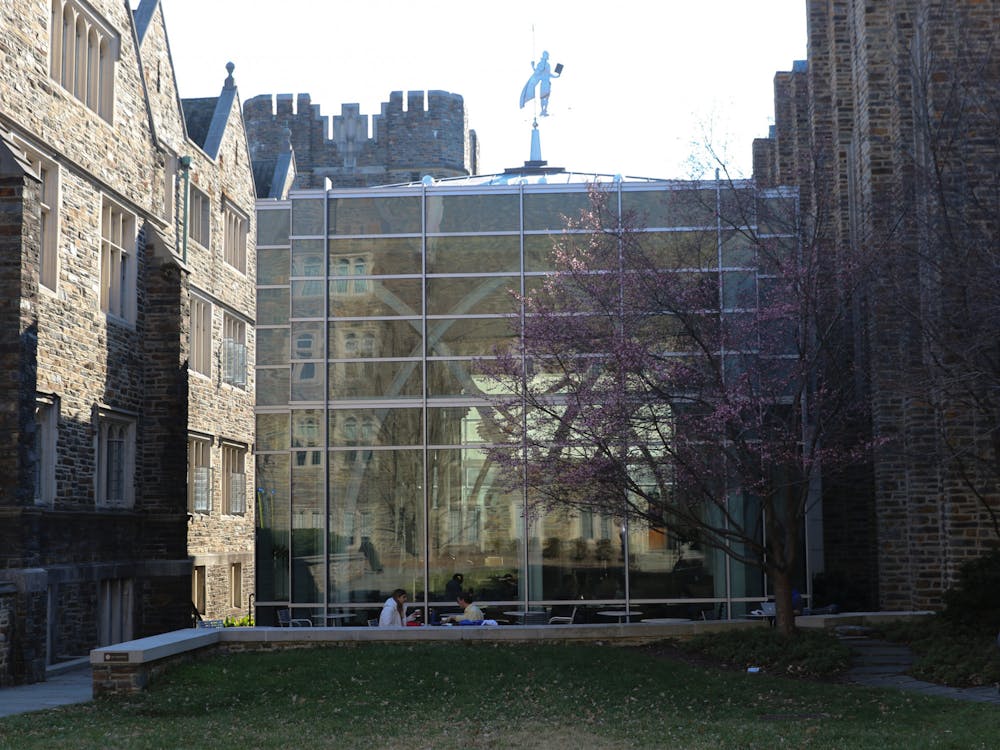The Academic Council heard updates from Strategy Team 2030 working groups during their February meeting. Provost Sally Kornbluth presented the outcomes of two of the working groups’ discussions to the Council.
The education working group—created in spring 2020—decided there were three principal ways to craft a new vision for Duke by 2030, according to Kornbluth: including more undergraduate opportunities in Duke’s research infrastructure, attracting the best undergraduate educators and allowing for “flexibility and integration” in learning.
“This is what distinguishes Duke from a [Williams College], an [Amherst College], a [Wesleyan University]. We have a big research operation, and we want our students to participate,” Kornbluth said.
Additional research opportunities would be added through the new undergraduate curriculum that is currently in development and by expanding connections between students and faculty, particularly within the professional schools.
“It's a little difficult to incentivize teaching excellence. And some of our professional school faculty really liked teaching undergraduates but find it fiscally and administratively difficult to teach or mentor undergraduate students,” Kornbluth said.
Professor of Cultural Anthropology Lee Baker found the proposal “interesting” but asked if the governance over curricula in the two undergraduate schools would remain with their respective faculties.
“Does [the proposal] take away from the engineering faculty governance and Arts and Sciences Council? Or are they still going to be the people responsible for the curriculum?” Baker asked. “Is there going to be a Duke degree [as] opposed to a [Trinity College of Arts & Sciences] degree that encompasses all the other schools?”
Kornbluth answered that the curriculum decisions should rest with the faculty of the undergraduate schools.
“We already have a lot of professional school faculty who participate in Bass Connections, for example, or DukeEngage, et cetera,” Kornbluth said. “They're obviously wanting to engage in undergraduate interactions and activities, but they've all been decorated around the edges of the curriculum.”
Kornbluth also proposed “re-imagining contracts, compensations and requirements for promotion” for faculty. She said that providing faculty more time to research, mentor and innovate their teaching could come from changing teaching loads.
The education working group also discussed changing Duke’s academic calendar to “accommodate different durations of learning experience” and harnessing technology to offer hybrid learning experiences.
Kornbluth discussed continuing to invest in faculty who have recently received tenure.
“We know that the transition to the associate professor level can be an inflection point for faculty,” Kornbluth said. “Just as people begin to feel liberated in terms of really spreading their intellectual wings, there's a lot more service expectations, there's less guidance and mentoring often. And you know, faculty can find it difficult at this stage.”
She said this new approach could help Duke “stand out, demonstrating Duke’s distinctive investment in and commitment to our faculty, and generate the kind of high-risk, high-reward research that can really have transformative impact.”
Shai Ginsburg, associate professor in the department of Asian and Middle Eastern studies, felt that the update was more geared towards faculty in the sciences. He said that instead of the funding structures Kornbluth presented, faculty in the humanities need more time than their scientific counterparts to conduct research.
“My experience with Duke is that it's very generous with monetary resources and very stingy with time,” Ginsburg said. “And especially in the humanities, we don't need labs, we need time. And yet, Duke has a sabbatical policy for the humanities and qualitative social sciences that is not on par with its peer [institutions].”
Kornbluth responded that the research working group’s conversations did include discussion about faculty in the humanities and social sciences and there were “strong voices in that realm.”
The next steps for Strategy Team 2030 will be coming up with ways to finance these initiatives, Kornbluth said.
In other business
The Council also heard updates regarding a proposal to establish a university-wide ombuds office. Executive Vice President Daniel Ennis said Duke is planning to hire two professional ombudspeople, one for faculty and staff and the other for students. Currently, faculty members serve part-time as the University’s ombudspeople.
The new ombudspeople, who offer “neutral and confidential guidance” and assist in conflict mediation and resource referral, would also support staff for the first time.
Trina Jones, Jerome M. Culp distinguished professor of law, was concerned that one ombudsperson serving both faculty and staff would be insufficient.
“We thought that it would be important for faculty to be able to be able to access different individuals, because we learned that there was some hesitation amongst some subgroups of faculty in terms of approaching one ombuds because of that person's demographic characteristics or their reputation,” Jones said.
Baker echoed this sentiment, adding that he hoped Duke would find an ombudsperson who could see situations through the eyes of faculty, students and staff.
“We need ombudspeople that really understand the student life, really understand the faculty life,” Baker said. “And then with the staff, there's so many different staff positions. A clinical person and a cafeteria worker have really different issues. And I just hope that we have the capacity to have an ombudsperson that has both expertise, empathy and just can see it through their eyes.”
Get The Chronicle straight to your inbox
Signup for our weekly newsletter. Cancel at any time.

Adway S. Wadekar is a Trinity junior and former news editor of The Chronicle's 119th volume.

